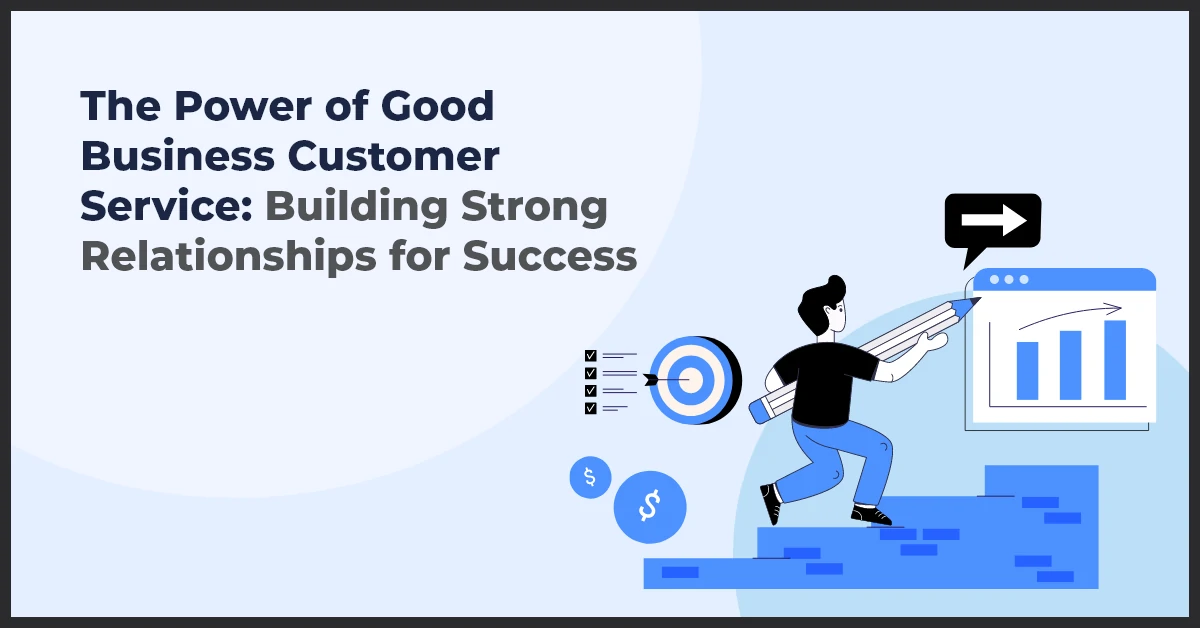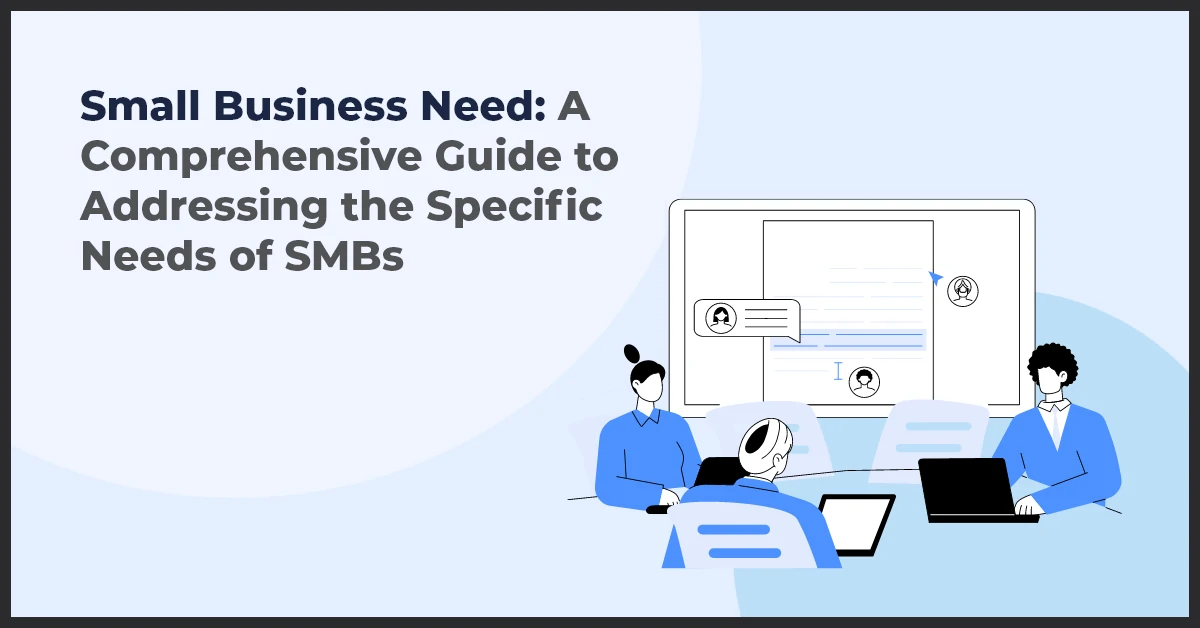The Power of Good Business Customer Service: Building Strong Relationships for Success

Published on: May 15, 2023
Updated on: October 02, 2024
2549 Views
- Business
12 min read
In today's competitive business landscape, providing exceptional customer service is more critical than ever. In this blog post, we will explore the significance of good business customer service and how it can foster strong relationships, enhance business customer loyalty, and drive overall success.
From understanding what is customer business relationship to identifying the best customers for your business, we will delve into various aspects of customer service and its impact on your company's growth.
What Is Customer Business?
Customer business refers to building strong and mutually beneficial relationships between a company and its customers. It goes beyond transactions, focusing on personalized experiences, tailored solutions, and exceeding customer satisfaction. Don’t confuse it with business customers.
Business customer definition is when a company that buys products from another business. Unlike individual consumers, business customers typically buy in larger quantities and have specific needs and requirements tailored to their operations.
How is the customer important for business, you ask?
Customers are essential for companies as they provide revenue, drive growth, and their satisfaction and loyalty are crucial for long-term success.
Some customer business examples include:
- Any software company providing tailored solutions for businesses to optimize their operations and improve efficiency.
- A consulting firm offering strategic advice and guidance to help businesses achieve their growth objectives.
- A marketing agency that provides comprehensive services to help businesses build their brand, attract customers, and increase sales.
- A supplier of industrial equipment and machinery catering to the specific needs of manufacturing businesses.
The Foundation of Good Business Customer Service
Good customer business service refers to the exceptional level of support, care, and assistance businesses provide to their customers professionally. It goes beyond meeting basic needs, creating remarkable experiences, and exceeding customer expectations.
In a business context, providing good customer service means consistently delivering high support, responsiveness, and problem-solving to customers throughout their interactions with your company.
What Are Business Customer Services?
Defining good business customer service involves understanding the principles of exceptional service in a business context. It includes being responsive, knowledgeable, and proactive in addressing customer needs and concerns. It means delivering personalized solutions, exceeding customer expectations, and consistently providing a positive experience.
Why Is Customer Service Important In Business?
The importance of business customer service is well known. It is the foundation for building and nurturing long-term relationships between businesses and their customers. Quality customer service contributes to the strength of the customer-business relationship by building trust, loyalty, and mutual respect.
Importance in Building Long-Term Relationships
Good business customer service plays a vital role in building and nurturing long-term relationships. By consistently delivering exceptional service, businesses create a positive perception among customers, enhance customer satisfaction, and build trust.
Such factors increase customer loyalty and the likelihood of repeat business, nurturing long-term customer-business relationships that are mutually beneficial to both parties.
The customer-business relationship is a dynamic interaction between the customer and the business based on mutual understanding, trust, and shared objectives. Quality customer service strengthens this relationship. It gives companies the best customers and the ability to demonstrate their commitment to the customer's success and satisfaction.
When businesses prioritize good customer service, they reap numerous benefits, including:
- Enhancing customer satisfaction: By providing outstanding service, businesses meet and exceed client expectations, leading to higher satisfaction.
- Increasing customer loyalty: When customers receive excellent service, they are more likely to remain loyal, choose your business over competitors, and recommend it to others.
- Generating positive word-of-mouth: Satisfied customers become brand advocates, sharing their positive experiences with others, thus helping to attract new customers.
- Differentiating from competitors: In a crowded marketplace, exceptional customer service sets businesses apart, giving them a competitive edge.
- Driving business growth: Loyal customers are more likely to make repeat purchases, upgrade their products or services, and become long-term revenue generators.
Identifying and Engaging with the Best Customers
Understanding the importance of identifying the best customers and engaging with them is crucial for business success. Businesses can optimize resources, drive growth, and cultivate strong relationships with their most valuable customers by focusing on these critical aspects.
1. Identifying the Best Customers
Conduct thorough research and try to identify your business's best customers. Look for customers who align closely with your target audience and share similar characteristics, such as industry, size, demographics, or purchasing behavior.
By understanding the traits of your best customers, you can focus on acquiring similar ones and tailor your marketing strategies to attract them.
2. Engaging with Customers
Engaging with your best customers goes beyond everyday interactions. It requires developing personalized communication and tailored solutions catering to their needs and preferences.
Effective customer engagement involves proactive outreach, attentive listening, and proactive problem-solving. You can strengthen the relationship with your best customers by providing exceptional business customer service, reinforcing their loyalty, and driving mutual success.
Importance of Engaging With the Best Customers
Engaging with the best customers is a strategic approach that maximizes the return on investment for your business. These customers typically contribute significantly to your revenue and play a vital role in spreading positive word-of-mouth. By nurturing and deepening these relationships, you can enhance customer satisfaction and unlock opportunities for upselling, cross-selling, and referrals.
3. Tailoring marketing efforts
Understanding your best customers allows you to tailor your marketing efforts and messages to resonate with their specific needs and preferences. By segmenting your customer base and customizing your marketing campaigns, you can deliver targeted and relevant content that addresses their pain points, showcases the value you offer, and ultimately drives conversions and customer retention.
4. Providing exceptional business customer service:
Exceptional business customer service is vital to engaging with the best customers. By delivering outstanding service experiences, you strengthen the bond with your customers, reinforce their trust, and position your business as their preferred partner.
This level of service includes being responsive, proactive, and attentive to their needs, offering personalized solutions, and consistently delivering on your promises.
Best Practices for Delivering Exceptional Business Customer Service
Delivering exceptional customer service relies on several fundamental principles that businesses should prioritize.
These principles include:
- Responsiveness: Timely and prompt responses to customer inquiries, concerns, and requests are essential. Customers appreciate businesses that are attentive and show a sense of urgency in addressing their needs. Quick response times demonstrate that you value their concerns and makes them feel important.
- Knowledgeability: Knowledge of your products, services, and industry is crucial in providing effective customer service. Customers expect representatives to have in-depth knowledge and expertise to answer questions, offer guidance, and provide accurate information. Keeping your team well-informed and up-to-date ensures that they can assist customers with confidence and accuracy.
- Empathy: Demonstrating empathy and understanding toward customers' challenges and frustrations helps to build rapport and trust. Empathy involves:
- Actively listening to their concerns.
- Showing compassion.
- Expressing genuine care for their needs.
You can better address their specific requirements and provide appropriate solutions by putting yourself in their shoes.
- Problem-solving skills: Effective problem-solving is critical to good business customer service. It involves analyzing situations, identifying the root cause of issues, and offering practical solutions. Customer service rep must be able to resolve problems efficiently and effectively, ensuring customers feel supported and satisfied.
- Creating a customer-centric culture: Having a customer-centric culture within your organization is vital to consistently delivering exceptional business customer service. Here's how you can establish and nurture such a culture:
- Leadership commitment: Begin by emphasizing the importance of customer satisfaction at different org levels. Leaders should demonstrate a solid commitment to customer service and communicate its significance throughout the company. This commitment sets the tone for a customer-centric mindset.
- Employee empowerment: Empower your employees to make decisions and take ownership of customer interactions. Give all the necessary training, resources, and authority to resolve issues independently. Encourage a proactive approach, where employees actively seek opportunities to improve the customer experience and go above and beyond to meet customer needs.
- Continuous training and development: Invest in regular training and development programs focusing on customer service skills, product knowledge, and problem-solving techniques. Keep your team updated on industry trends and customer expectations, ensuring they have the tools to provide exceptional service.
- Open communication channels: Establish channels for customers to provide feedback, share their experiences, and voice their concerns. Actively listen to their feedback and use it to drive improvements in your products, services, and customer service processes. Regularly communicate with your customers, keeping them informed about updates, changes, and opportunities for engagement.
- Reward and recognition: Acknowledge and reward employees who consistently deliver exceptional customer service. Recognize their efforts publicly, reinforcing the importance of providing outstanding service.Implement performance metrics and reward systems that align with customer-centric goals, encouraging employees to strive for excellence in customer service.
What Is Business Customer Loyalty?
Exceptional customer service is a crucial driver of customer loyalty. Building strong customer relationships and loyalty requires trust, open communication, personalized attention, prompt issue resolution, and delivering exceptional customer service consistently.
Here's how it impacts loyalty and tips for sustaining long-term customer loyalty:
- Positive experiences: Consistently delivering exceptional customer service creates positive experiences for business customers. These positive interactions build trust and loyalty over time. Aim to exceed expectations and create memorable moments that leave a lasting impression.
- Personalized customer experience: Tailor your interactions and offerings to meet your business customers' specific needs and preferences. Customization and personalization demonstrate that you value their unique requirements, building loyalty and a sense of exclusivity.
- Proactive support: Anticipate and address the needs of your business customers proactively. Offer guidance, suggestions, and resources to help them achieve their goals. You deepen the customer relationship by being a trusted advisor and providing value beyond the transaction.
- Loyalty programs and incentives: Consider implementing loyalty programs or incentives tailored to your business customers. Reward their continued loyalty with exclusive discounts, special offers, or access to additional services. These initiatives reinforce their commitment to your business and incentivize repeat purchases.
- Regular communication and engagement: Stay in touch with your business customers through regular contact. Provide updates, share relevant industry insights, and offer support even when they are not actively purchasing from you. This ongoing engagement builds a sense of loyalty and keeps your business top of mind.
- Seek feedback and act on it: Actively seek feedback from your business customers and demonstrate that you value their opinions. Use their feedback to improve your products, services, and customer experiences.
Best Practices for Building Strong Customer Relationships and Loyalty
To thrive in the business world, it's crucial to establish trust and rapport with your customers.
Here are strategies for cultivating trust and rapport with your business customers.
- Consistent delivery: Continually deliver on your promises, ensuring your product's quality meets or exceeds customer expectations. Reliability builds trust and demonstrates your commitment to customer satisfaction.
- Open communication: Maintain open and transparent communication channels with your business customers. Listen to their feedback, concerns, and suggestions, and respond promptly and respectfully. Effective communication creates a sense of collaboration and partnership.
- Personalized attention: Treat each business customer as an individual with unique needs and preferences. Take the time to understand their specific challenges and tailor your solutions accordingly. You build trust and strengthen the relationship by demonstrating a genuine interest in their success.
- Resolve issues promptly: When problems or challenges arise, address them quickly and effectively. Show empathy and take ownership of finding a solution. Promptly resolving issues demonstrates your commitment to customer satisfaction and can enhance loyalty if handled well.
Customer Business Manager Salary
The salary of a business customer service manager can differ depending on the company size, industry, location, experience level, and the specific responsibilities of the role. Salaries can also differ between different countries and regions.
In general, the salary range for a business customer service manager can vary significantly. In the United States, the salary for this position is typically between $50,000 and $100,000 per year.
In addition to the base salary, business customer service managers may also receive bonuses or incentives based on performance, which can further contribute to their overall compensation. The salaries of a customer business analyst are slightly lower than a manager's.
These salaries can change over time, and market demand, industry trends, and the overall economic landscape influence the pay scale. Therefore, it's always advisable to research job postings and consult industry salary surveys or resources for accurate and up-to-date salary information.
Final Thoughts
Good customer service is no longer an option in today's competitive business landscape—it's a fundamental pillar of success. By prioritizing exceptional customer experiences, nurturing strong relationships, and consistently providing value at every interaction, businesses can stay ahead of the competition and drive long-term growth.
Embracing a customer-centric mindset is crucial. Implementing the best practices, such as consistent delivery, open communication, personalized attention, and prompt issue resolution, can help you build a loyal customer base and enhance your brand reputation.
Remember, putting your customers first is the key to thriving in today's business world. So, don't wait any longer. Take action now and prioritize exceptional customer service to position your business at the forefront of your industry.
Whether you develop these strategies in-house or seek professional assistance at info@growthnatives.com or call +1 855-693-4769, the journey starts with a commitment to providing outstanding customer experiences. If it's the latter, we are here to help. Contact us today and embrace the customer-centric approach and watch your business flourish in the years to come.
Your customers deserve it, and your business deserves it too.
Frequently Asked Questions
Good business customer service involves providing timely, helpful, and personalized support to customers before, during, and after a purchase to meet their needs and exceed their expectations.
Good customer service is important for businesses because it enhances customer satisfaction, fosters loyalty and repeat business, generates positive word-of-mouth referrals, and strengthens the overall reputation and brand image of the company.
Good customer service impacts business success by driving customer retention and loyalty, reducing churn rates, increasing customer lifetime value, attracting new customers through positive referrals and reviews, and ultimately, boosting revenue and profitability.
The benefits of investing in good customer service include increased customer retention and lifetime value, higher customer satisfaction and loyalty, reduced customer complaints and negative feedback, and a competitive edge in the market.
Businesses can improve their customer service practices by training employees on effective communication and problem-solving skills, implementing customer feedback systems, leveraging technology to streamline support processes, and fostering a culture of continuous improvement.



